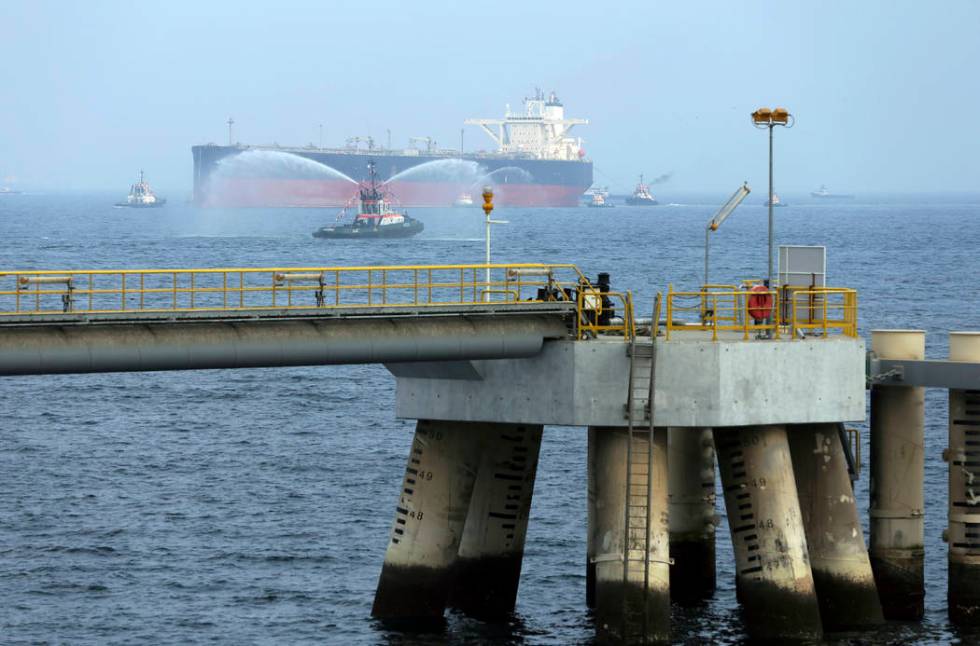Saudi Arabia says 2 oil tankers damaged by sabotage

DUBAI, United Arab Emirates — Saudi Arabia said Monday two of its oil tankers were sabotaged off the coast of the United Arab Emirates in attacks that caused “significant damage” to the vessels, one of them as it was en route to pick up Saudi oil to take to the United States
The announcement by the kingdom’s energy minister, Khalid al-Falih, came as the U.S. issued a new warning to sailors and the UAE’s regional allies condemned the reported sabotage Sunday of four ships off the coast of the port city of Fujairah.
The statement came just hours after Iranian and Lebanese media outlets aired false reports of explosions at the city’s port. Emirati officials have declined to elaborate on the nature of the sabotage or say who might have been responsible.
However, the reports come as the U.S. has warned ships that “Iran or its proxies” could be targeting maritime traffic in the region, and as America is deploying an aircraft carrier and B-52 bombers to the Persian Gulf to counter alleged threats from Tehran.
Shortly after the Saudi announcement, Iran’s Foreign Ministry called for further clarification about what exactly happened with the Saudi tankers. The ministry’ spokesman, Abbas Mousavi, was quoted by the official IRNA news agency as saying there should be more information about the incident.
Mousavi also warned against any “conspiracy orchestrated by ill-wishers” and “adventurism by foreigners” to undermine the maritime region’s stability and security.
Tensions have risen in the year since President Donald Trump withdrew the United States from the 2015 nuclear deal between Iran and world powers, restoring American sanctions that have pushed Iran’s economy into crisis. Last week, Iran warned it would begin enriching uranium at higher levels in 60 days if world powers failed to negotiate new terms for the deal.
In his statement, al-Falih said the attacks on the two tankers happened at 6 a.m. Sunday.
“One of the two vessels was on its way to be loaded with Saudi crude oil from the port of Ras Tanura, to be delivered to Saudi Aramco’s customers in the United States,” al-Falih said. “Fortunately, the attack didn’t lead to any casualties or oil spill; however, it caused significant damage to the structures of the two vessels.”
Saudi Arabia did not identify the vessels involved, nor did it say whom it suspected of carrying out the alleged sabotage.
Underling the regional risk, the general-secretary of the six-nation Gulf Cooperation Council described the alleged sabotage as a “serious escalation” in an overnight statement.
“Such irresponsible acts will increase tension and conflicts in the region and expose its peoples to great danger,” Abdullatif bin Rashid al-Zayani said. Bahrain, Egypt and Yemen’s internationally recognized government similarly condemned the alleged sabotage.
A statement Sunday from the UAE’s Foreign Ministry put the ships near the country’s territorial waters in the Gulf of Oman, east of the port of Fujairah. It said it was investigating “in cooperation with local and international bodies.” It said there were “no injuries or fatalities on board the vessels” and “no spillage of harmful chemicals or fuel.”
The U.S. Navy’s 5th Fleet, which oversees the region, did not immediately offer comment. Emirati officials declined to answer questions from The Associated Press, saying their investigation is ongoing.
Earlier Sunday, Lebanon’s pro-Iran satellite channel Al-Mayadeen, quoting “Gulf sources,” falsely reported that a series of explosions had struck Fujairah’s port. State and semi-official media in Iran picked up the report from Al-Mayadeen, which later published the names of vessels it claimed were involved.
The AP, after speaking to Emirati officials and local witnesses, found the report about explosions at the port to be unsubstantiated.
Fujairah’s port is about 140 kilometers (85 miles) south of the Strait of Hormuz, the narrow mouth of the Persian Gulf through which a third of all oil at sea is traded. The facility handles oil for bunkering and shipping, as well as general and bulk cargo. It is seen as strategically located, serving shipping routes in the Persian Gulf, the Indian subcontinent and Africa.
Sunday’s incident comes after the U.S. Maritime Administration, a division of the U.S. Transportation Department, warned Thursday that Iran could target commercial sea traffic.
“Since early May, there is an increased possibility that Iran and/or its regional proxies could take action against U.S. and partner interests, including oil production infrastructure, after recently threatening to close the Strait of Hormuz,” the warning read. “Iran or its proxies could respond by targeting commercial vessels, including oil tankers, or U.S. military vessels in the Red Sea, Bab-el-Mandeb Strait or the Persian Gulf.”
Early Sunday, the agency issued a new warning to sailors about the alleged sabotage, while stressing “the incident has not been confirmed.” It urged shippers to exercise caution in the area for the next week.
Publicly available satellite images of the area taken Sunday showed no smoke or fire.
It remains unclear if the previous warning from the U.S. Maritime Administration is the same perceived threat that prompted the White House to order the USS Abraham Lincoln aircraft carrier strike group and B-52 bombers to the region on May 4.
___
Associated Press writers Aya Batrawy in Dubai, Bassem Mroue in Beirut, and Amir Vahdat in Tehran, Iran, contributed to this report.